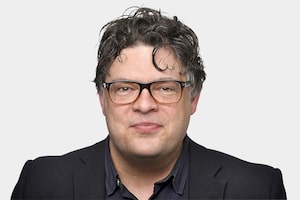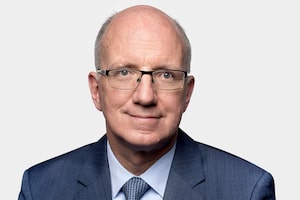Former Prime Minister Brian Mulroney, centre, with Quebec Premier Jean Charest, left, and Quebecor Chief Executive Pierre-Karl Peladeau at the launch of his memoirs in Montreal on Sept. 10, 2007.Ryan Remiorz/The Canadian Press
Brian Mulroney sat on the board of directors of Montreal-based media company Quebecor Inc. QBR-B-T for more than two decades until his death. In a sign of the respect he commanded – and of French Canadian language formalities – he remained “Mr. Mulroney” to chief executive Pierre-Karl Péladeau until the end.
The former prime minister carved out a unique place in the hearts and minds of Canada’s business and political leaders, and that was especially true in Quebec, his home province. He might have failed to bring Quebec into the Constitution, but that did not stop him from receiving the Order of Quebec in 2002. He was the first Canadian prime minister to be given the honour.
“My family has always been in Quebec for the last 150 years,” a beaming Mr. Mulroney told reporters at the time, in the Salon Rouge of Quebec’s legislature. “For me and my family it’s an important day.”
Mr. Mulroney died Thursday, surrounded by his family. Close associates and friends are now celebrating a man who made a profound mark on the country in a way few political leaders have since. They recall him as a big-thinking prime minister who ushered in transformative change for Canada, including major tax reform and continent-spanning trade deals, culminating in the North American Free Trade Agreement. And they remember the way he tried to bridge the gap between Quebec and the rest of the country.
“He often said, ‘Well, I got two out of three,’” said Yves Fortier, an international arbitration lawyer who had known Mr. Mulroney since the the 1960s. Mr. Fortier served as ambassador to the United Nations for four years under Mr. Mulroney’s Progressive Conservative government.
Mr. Fortier said the former prime minister had a way of making people feel like they mattered, and was exceedingly generous with his time. He was a confidant and supporter as much as he was a leader.
“You have no idea the number of people who were going through dark moments whom he called,” he added. “Even if you didn’t solicit his counsel, the phone would ring and you’d hear a deep voice. ‘Hello, this is Brian. I hear you’re thinking of doing this or been through that.’”
In the 1980s, the Mulroney government privatized a number of Crown corporations, including Air Canada. That successful $200-million stock offering paved the way for subsequent sales of several government-owned businesses, by politicians of all stripes. In 1995, the federal Liberals sold Canadian National Railway Co. CNR-T, another Montreal-headquartered national champion.
“I want to call out Mr. Mulroney’s unmatched contributions to Canadian business, innovation and job creation,” Calin Rovinescu said in a news release Friday. Mr. Rovinescu served as the lead external counsel on Air Canada’s privatization and was the airline’s CEO from 2009 to 2021. “Besides NAFTA and the ambitious privatization programs of the 1980s, Brian contributed enormously to the capabilities of Canadian companies domestically and internationally.”
Paul Tellier, who served as clerk of the Privy Council under Mr. Mulroney and later oversaw the CN privatization, said the former prime minister’s instinct that the government had no business running such corporations has been proven correct. Mr. Mulroney was also correct in his insistence that Canada could not isolate itself economically and needed a continental trade pact, Mr. Tellier said.
“Where would Canada be today without such an agreement?” he added. “I mean, it would be a hell of a mess.”
Mr. Mulroney sought to forge international alliances with the same vigour he applied to reconciling Canada’s two solitudes, Mr. Tellier said.
“There are very few people in the business world in Quebec who are comfortable on both sides – in the French-speaking milieu and in the rest of Canada. And Brian Mulroney was one of them,” Mr. Tellier continued. “He was as comfortable in Montreal as he was in Toronto or Vancouver.”
Before entering politics, Mr. Mulroney worked as a corporate lawyer at the powerhouse Montreal law firm Ogilvy Renault, now Norton Rose Fulbright Canada LLP. He rejoined the firm after leaving office and served on several corporate boards, including those of agricultural trading giant Archer Daniel Midland and Barrick Gold Corp. ABX-T
Mr. Mulroney advised two generations of the Péladeau family. He helped founder Pierre Péladeau build Quebecor in the late 1960s, then worked with Mr. Péladeau’s son, CEO Pierre Karl Péladeau, to transform the company into Quebec’s dominant media content producer and a national telecommunications platform.
Mr. Mulroney’s “sound counsel played an important role in Quebecor’s growth and its present-day success,” Pierre Karl Péladeau said in a statement. “It was a privilege to be able to count on his vast experience and wisdom.”
Tony Fell, former CEO of RBC Dominion Securities, the investment dealer arm of Royal Bank of Canada, recalled Mr. Mulroney as a visionary. “As a leader, Brian had a vision for Canada’s future, and that big picture vision drove the policies he set and executed on, including free trade and the GST,” he said. Mr. Fell added that Mr. Mulroney was a “truly great prime minister” who believed domestic businesses would benefit from access to, and competition with, the U.S. market.
“Brian never forgot his roots in Baie-Comeau. His experience growing up in Quebec shaped his drive,” Mr. Fell said.
Former Quebec Premier Jean Charest served in Mr. Mulroney’s cabinet. In an interview Friday, he said Mr. Mulroney’s pitch during the 1983 PC leadership race was that he would be the leader to make a breakthrough in Quebec. He argued the party was going to be in opposition forever if it didn’t make inroads in the province.
That promised triumph happened the following year, when Mr. Mulroney won a massive majority in the 1984 election. What followed was a golden period of relations between Ottawa and the government of Quebec, Mr. Charest said. “Things got done. And he put himself at risk very much on the national unity file.”
But it wouldn’t be easy, or fruitful in the end. One of Mr. Mulroney’s great disappointments was that the Meech Lake constitutional accord did not go through.
“This was, for him, something that he felt very strongly about,” Mr. Charest said. “It would be a mistake to interpret what he did on Meech Lake as being something for Quebec, when in fact, for him, it was always very clear that this was about the country – fixing something that it needed to fix and moving on to better things.”
 Nicolas Van Praet
Nicolas Van Praet Andrew Willis
Andrew Willis Kelly Cryderman
Kelly Cryderman